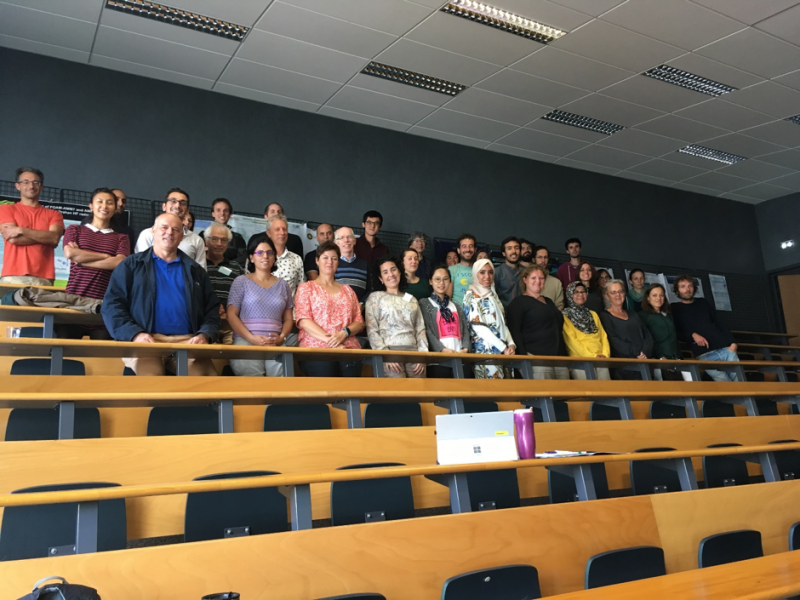International Summer School On Radio-Oceanography: Caen
Matteo Marasco
University of the Higlhands and Islands

I am grateful to Challenger Society, for the travel Award 2017, which massively contributed to finance my attendance to the International Summer School on Radio-Oceanography (ISSOR’17) in Caen (France). From 21st to 25th of August, I have been in the most remarkable radio-oceanography community of the world.
The first edition of the ISSOR’17 was specifically designed for postgraduate and post doc scientists involved in radar applications. This 5-days summer school focused on theoretical and practical fundamentals of 35 years of radar oceanography research, paying particular attention on the most recent developments. The program included lectures by a diverse set of international experts who are leaders in their fields. Each lecture covered a broad spectrum of problems related to radio-oceanography and different high frequency and x-band radar technologies, including analysis of sea states and upper ocean currents. The measurement validation steps and data processing methods for surface currents were taught using practical exercises based on two high frequency radar case studies: the Iroise marine renewable energy system and the American West Coast tsunami detection system. Further sessions on data assimilation techniques for the inclusion of numerical models and Doppler spectrum analysis were held.
I was delighted to be in this extraordinary young scientist community, where connections, exchange of ideas and cooperation were easy to establish. During the training, we had systematic breaks in order to have valuable conversations about the daily session and interesting non-scientific chats. Speakers were loquacious, friendly and open to any kind of question. This atmosphere made me feel comfortable and secure in such a specialised environment.
The exceptional science spread during those days has provided further motivation for my studies. I had the unique opportunity to talk with some of the best radar scientists, sharing with them questions and doubts about my research. I also had the chance to network with PhD students, which are exploring the radar technology from different prospective. Those meetings made a precious contribution to my personal experience. As an early researcher, the knowledge gained during the summer school gave me a better grasp of the radar technology and an excellent background to refine my research questions.
I would like also to thank both Environmental Research Institute and UHI for enabling me to attend the summer school.
Profile:
I am currently undertaking the second year of my PhD studies exploring coastal High Frequency Radar system as a novel method of monitoring tidal currents and estimating residual circulation in the Fair Isle Gap.
Latest News
Marine Data Management, Governance and the MEDIN toolset
The Marine Environmental Data and Information Network (MEDIN) and OceanWise are delighted to invite you to attend our popular free online training workshop: ‘Marine Data Management, Governance and the MEDIN toolset’ on the 19th – 23rd of May 2025.
Workshop on the contribution of UK Arctic Ocean science to the International Polar Year 32/33
12:00 11th June – 16:00 12th June 2025: NOC Southampton (In-person with online option): Registration deadline 16th May
REGISTER HERE
Pre-meeting questionnaire (open to all)
The purpose of this workshop is for the UK Ocean Science community to discuss and then draft a prospectus document outlining the priority Arctic research questions the community would like to address during the run up to, throughout and beyond the International Polar Year 32/33. Additionally, to identify what unique strengths and technologies the UK has to help fill these knowledge gaps.
The second day of the workshop will be dedicated to writing groups, one for each of the priority research questions identified - from both the pre-meeting questionnaire (HERE) and day one discussion. By the end of the meeting, each group will have produced draft text and sourced supporting figures for the prospectus.
Post meeting, the draft will be opened for comments and suggestions from everyone, regardless of whether they were able to attend the workshop or not. It will then be shared with UK funders (UKRI, FCDO, DSIT, ARIA) and potential international programmes with whom we would like to collaborate (e.g. Arctic 2050, Norway). It will form a basis from which wider integration with terrestrial, atmospheric and cryosphere communities can be built, e.g. at the UK Arctic Science Meeting in September in Northumbria.
To ensure balanced community and ECR representation, and to ensure that the size of the writing groups is efficient and effective, if the number of registrations from individual institutes becomes overwhelming, we may contact individuals or teams and ask that each institute selects a smaller number of individuals to attend in-person. Please wait for confirmation of in-person attendance before finalising travel arrangements.
The workshop will be open to hybrid attendance and contributions on both days.
Challenger Society Council Position Vacancy
The Challenger Society for Marine Science (CSMS) are pleased to announce an exciting opportunity to support the next generation of ocean scientists and innovators. CSMS are looking for a new Council member to fill the Student Travel Awards and Stepping Stones Portfolio. The successful applicant will administer the travel and research grants available for Early Career Researchers.
The role involves:
- Receiving applications for the two schemes and responding to applicant inquiries
- Soliciting and compiling input from the rest of the Council for assessing the applications
- Communicating with successful and unsuccessful applicants for the two schemes
- Working with the Honorary Treasurer on allocating funds to successful applicants
- Following up with award winners on their reporting requirements
- Attending Council meetings four times a year (in person or online) and contributing to discussions and decision making for CSMS
The usual term for Council members is three years.
For more information about the CSMS Council, please follow this link: https://www.challenger-society.org.uk/The_Council
For more information about our Early Career Researcher grants and awards, please follow this link:
https://www.challenger-society.org.uk/Stepping_Stones
and
https://www.challenger-society.org.uk/Travel_awards
If you are interested in applying or have any questions regarding the role, please contact kathen@bas.ac.uk
